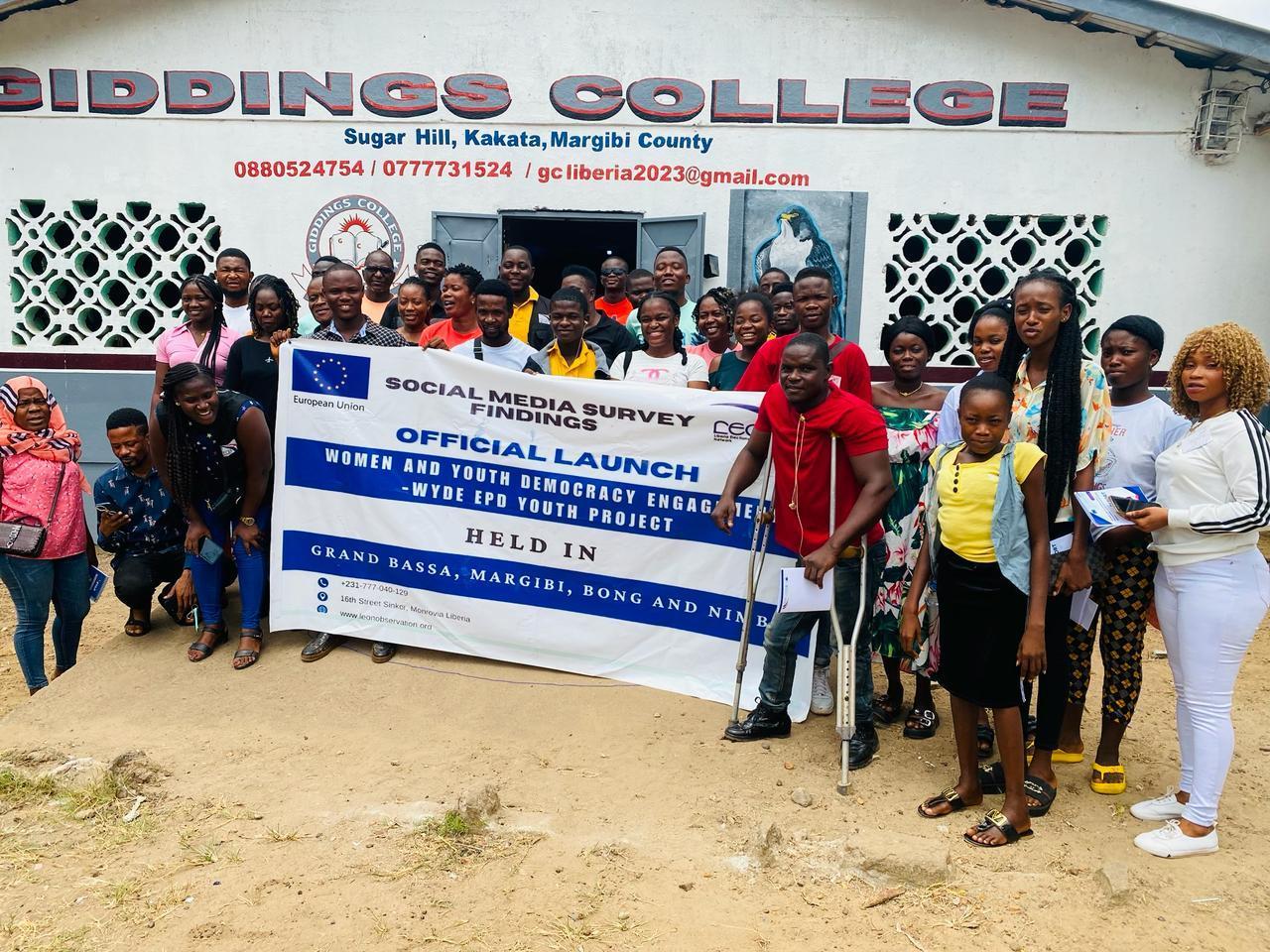Africa-Press – Liberia. The Liberia Elections Observation Network (LEON) has officially released a social media survey finding on the connection between social media and decision-making among young people of Liberia.
The LEON’s launch of the European Partners for Democracy-EPD “Women and youth Democracy Engagement” Youth project -SOCIAL MEDIA survey findings took place on Saturday, February 17, in Kakata, Margibi County.
Launching the report, LEON’s Head of Secretariat, Augustine S.M. Tamba, said social media plays a pivotal role in today’s era affecting every aspect of life including democracy and elections.
Social media, Mr. Tamba said, has affected Liberia’s democratic processes in past and current elections and understanding the impact of social media on democratic processes.
“LEON has been monitoring social media since 2019 with the aim of linking social media contents to democratic processes to further understand the impact of social media during the 2023 election especially affecting the youth, the Liberia Elections Observation Network-LEON received funding from the European Partners for Democracy-EDP to monitor Social media and assess its impact on youth political participation.” he disclosed.
Tamba said, as part of the project, LEON conducted a comprehensive survey exploring the sources of information gathering, impact of social media on the lives of youths and how contents on social media change the opinion of the youths during elections.
He explained that the launch of the survey findings across the country is aimed at further engaging the youth of the country with the results from the survey.
Survey’s Findings
LEON’s Head of Secretariat, Augustine S.M. Tamba, disclosed that LEON conducted the survey between September 4-11, 2023, and 73 enumerators across the 15 counties targeted the total of 1,241 respondents.
He explained that notably, 70% of respondents cited social media as a significant source of misinformation, highlighting the need for digital literacy, and critical thinking.
66.5%, according to him, acknowledged the influence of social media and its substantial role in shaping decision-making. This influence, he said, extends beyond information consumption, impacting attitudes and a behavior, adding that online bullying was prevalent, with 33.3% reporting such experiences and a majority did not report incidents, emphasizing the importance of safer online environments.
Tamba noted that although 66.5% of respondents acknowledged social media influence—engagement of social media for “social issues” varied. 47% of those surveyed, he said, revealed “not engaging” social media for social issues; 25% frequently engaged the social media and 28% occasionally engaged in social media activities leading to the variation in the perceived accuracy of information on social media.
Continuing, Tamba stated: “The survey found that a significant proportion of respondents 47% were likely to be influenced through social media—and a considerable percentage of 48.7% frequently or occasionally changed their opinions based on issues discussed on social media. This highlights the need for a distinct approach to digital literacy and fact-checking for informed decision-making.”
Tamba asserted that the survey analysis provides valuable insights into the complex relationship between social media, demographics, and decision-making.
“The survey findings emphasize the need for responsible social media use, digital literacy, and fact-checking to navigate the digital landscape effectively. The findings offer a foundation for informed discussions and actions to foster a positive online environment in line with accuracy, respect, and digital literacy.” Tamba asserted.
LEON Forwards Recommendations
According to Augustine S.M. Tamba, based on the survey’s findings, LEON has proposed the formation of education initiatives to implement comprehensive digital literacy programs that include critical thinking skills to empower citizens to discern and counteract misinformation on social media.
He’s recommending the need for a policy development that will foster collaboration amongst relevant stakeholders, including government bodies and social media platforms, to establish clear policies and regulations that prevent the misuse of social media and address online bullying.
Tamba is further calling for the creation of gender-specific interventions to develop targeted initiatives to support gender equality on social media, provide resources for females facing online bullying, and promote an inclusive and safe digital space.
He is at the same time commending the need to establish the promotion of offline engagement to focus on launching campaigns and initiatives to encourage youth to take part in offline activities related to political issues they learn about on social media—and encourage fostering informed participation that will focus on developing educational programs and resources to enhance political awareness among the youth and promote informed participation.
About LEON
The Liberia Elections Observation Network (LEON) is a platform of four Liberians civil society organizations, the Catholic Justice and Peace Commission (JPC), Liberia Crusaders for Peace (LCP), Federation of Liberian Youth (FLY) and National Union of Organizations for the Disabled (NUOD) with the overall goal of meaningfully contributing to the democratization process in Liberia by providing an avenue for civil society to participate in monitoring and observing elections and democratic processes in Liberia, LEON observed the 2017 and 2020 elections with over 1000 observers and issued statements on pre-elections, election day and post-election activities. In 2019, LEON engaged in monitoring the Legislature with the aim of increasing legislative openness and transparency for better representation that lead to improved social service delivery in constituencies.
LEON has a steering committee comprised of members of the four member organizations and a secretariat of 17 persons including four regional coordinators who coordinate and oversee the short-term and long-term observers. LEON has a focus on the inclusion of marginalized groups including women, youth, and persons with disabilities.
For More News And Analysis About Liberia Follow Africa-Press






